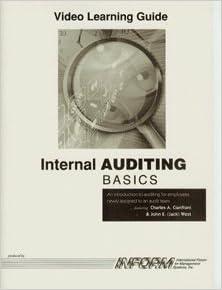Answered step by step
Verified Expert Solution
Question
1 Approved Answer
During the period 2 0 1 5 to 2 0 1 8 , RSM engaged in improper professional conduct during multiple audits of Revolution Lighting
During the period to RSM engaged in improper professional conduct during multiple audits of Revolution Lighting Technologies, Inc. Revolution RSM failed to properly conduct audits of Revolution's financial statements and internal control over financial reporting. RSM failed to adhere to Public Company Accounting Oversight Board PCAOB auditing and quality control standards, from planning and supervision of the audit through the evaluation of the audit results and review of Revolution's disclosures. PCAOB is an entity established by Congress to among other things, oversee the audits of public companies in order to protect investors. Among PCAOB's primary duties are establishing the standards that registered public accounting firms must meet when they audit public companies.
Revolution's financial statements were materially misstated because they included improperly recognized revenue from "bill and hold" sales, which are generally a type of transaction that involves a company selling a product to a customer but not delivering the product to the customer until some later date. Bill and hold sales need to satisfy several criteria in order for a company to be able to recognize them as revenue meaning the sales get recorded as revenue in a company's books and records and reported as revenue in a company's financial statements Audit evidence provided to RSMs audit team during the audits demonstrated that Revolution was violating US Generally Accepted Accounting Principles GAAP with respect to recognition of revenue in its financial statements from these bill and hold sales. RSMs audit team unreasonably failed to comply with professional standards by cor. financial statements conformed with GAAP.
During the course of RSMs audit of Revolution's fiscal year financial statements the Audit"; prior years' audits will be named the X Audit" RSMs engagement team and national office concluded that Revolution had improperly recognized revenue in fiscal year due to Revolution's failure to adhere to fixed delivery dates for its bill and hold sales, and presumed that this issue also impacted revenue recognition in each of the preceding three years. RSM then concluded that Revolution's revenue misstatements were immaterial and therefore Revolution did not need to restate its financial statements. RSMs conclusion was unreasonable because it was based on faulty estimates, and it rested upon its determination that qualitative factors outweighed the fact that, even under its faulty estimates, Revolution's misstatements of revenue significantly exceeded the quantitative audit materiality level that RSM had identified for several of the periods in question. In reaching the decision that qualitative factors rendered immaterial the fact that revenue figures for multiple years were misstated, RSM effectively abandoned the audit team's own prior determination, in each of the years in question, that reported revenue was a key metric of interest to shareholders of Revolution. During this analysis, RSM violated the applicable PCAOB standards.
Questions
Based on the description, what journal entry did Revolution make and what journal entry should Revolution have made? Note: You only need the accounts...not the amount
Explain the concept of materiality. Are firms allowed to consider quantitative and qualitative items when determining materiality?
Based on the limited information, why do you think the SEC punished RSM since the scheme was conducted by Revolution?

Step by Step Solution
There are 3 Steps involved in it
Step: 1

Get Instant Access to Expert-Tailored Solutions
See step-by-step solutions with expert insights and AI powered tools for academic success
Step: 2

Step: 3

Ace Your Homework with AI
Get the answers you need in no time with our AI-driven, step-by-step assistance
Get Started


